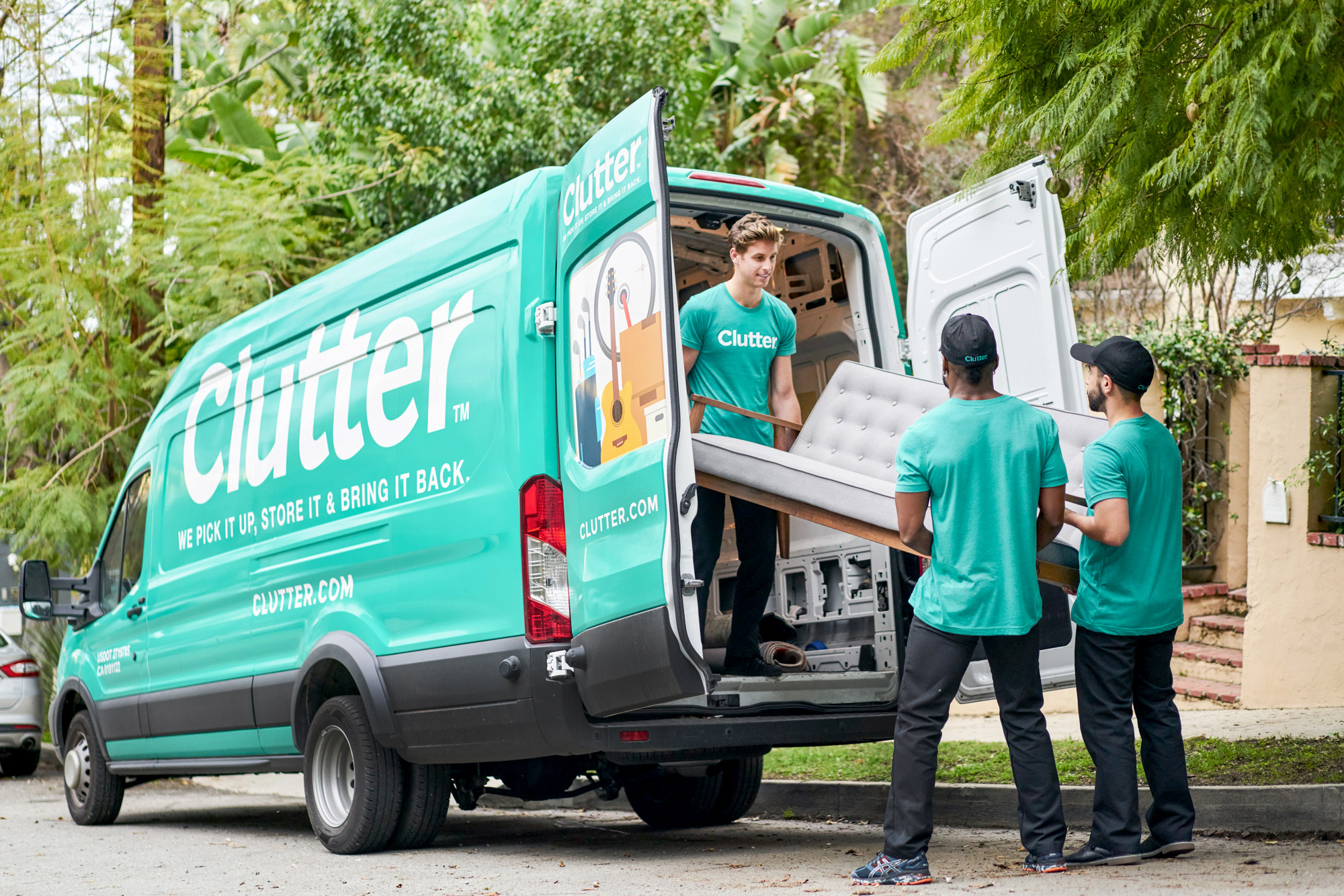Congrats on your new home! Now you have to figure out how you’re going to pack and move everything without breaking the bank, your fragile lamp, or your back. Good thing we put together this list of 41 easy moving and packing tips that will make your move smooth.
How do we know these tips actually work?
We asked expert movers, packers, and professional organizers to share their best tips, one of them being Clutter.com. If you need storage and someone who will take all the heavy lifting off your hands, get in touch with them.
Important Packing Tips for Moving (Decluttering, organizing, and actual packing steps)
Moving to a new home is an exciting chapter. Whether you’re moving to a new house or downsizing to a smaller place, having the right moving tips and packing tips for moving will save you a ton of stress.
First, create a moving packing list and start organizing your stuff, don’t wait until the last minute. How to prepare for your move isn’t just about boxing everything up; it’s about getting your ducks in a row so nothing catches you off guard. By following these tips for moving, you’ll breeze through the process and be able to comfortably enjoy your new living spaceWith the right strategies, moving can be easy and maybe even a little fun!
1. Get rid of everything before the packers and movers come
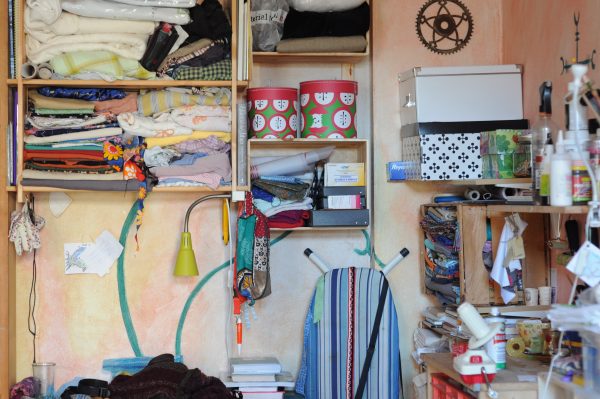
To make your move more efficient, cut back on the number of items you have to pack, move, and unpack. Begin by taking away unused or unneeded items several weeks prior to moving day. Professional organizer Ellen Delap suggests decluttering the moment you realize you’ll be moving.
Be honest with yourself—donate clothes that you haven’t worn in a few months and toss broken items such as appliances. This initial clean sweep will simplify packing, save you effort and time, and reduce the cost of moving. A planned strategy to declutter means you bring only what matters most to your new place, making the transition smoother.
2. Sort things by category

Take a cue from Marie Kondo and organize your belongings by category, not by room (note that the category part only applies to the organization process, not the unpacking — that’s a whole separate ordeal). Instead of spending a day cleaning out your entire bedroom, spend an afternoon sorting through every article of clothing you own.
Scour every coat closet, dirty clothes hamper, and laundry room until you’ve got all your clothes in one place. Then sort. Do the same thing for books, shoes, important papers, and the like.
3. Donate

If you’d like to donate your items, check out our guide on where to donate your old clothes, books, furniture, toys, and more.
4. Set aside items to sell

Got stuff you don’t need anymore? Don’t just toss it—turn it into moving money instead. Set aside anything valuable that could fetch a decent price, like that designer handbag you never use or the vintage records collecting dust.
Platforms such as Craigslist, Poshmark, and eBay make selling straightforward. Snap some good photos, write honest descriptions, and handle the logistics of shipping. The key is starting early so you’re not scrambling to sell everything the week before your move. Those extra dollars can help cover moving truck rentals or pizza for your helpful friends.
5. Clutter
Consider using a storage service like Clutter for items you can’t move immediately.
They will pick up all your stuff (yep, even your heavy furniture, bike, AC unit, and luggage), store it in their secure and temperature-controlled storage facility, and create an online photo catalog so you can see everything without having to visit a self-storage unit.
The best part: Whenever you need an item back, all you have to do is select its photo, and they willl deliver it to you.
Learn more: 5 Must-Have Packing Supplies for a Stress-Free Move
6. Source Moving Boxes from Local Businesses
Your local stores might just become your best friend during moving season. Pop in and ask if they have any used boxes they’re getting rid of—most stores are more than happy to let you take them since it saves them a trip to recycling.
Just give the boxes a quick once-over before you take them home. You want sturdy ones without any major rips or soggy spots. These are perfect for your lighter stuff like blankets, clothes, and towels, but don’t get tempted to cram them with heavy books or your grandmother’s china. You don’t want to be picking up scattered belongings from your driveway on moving day because a box decided to give up on you.
7. Keep Original Boxes for Electronics if Possible
Your flat-screen TV might look tough, but it’s actually pretty delicate—definitely not something you want bouncing around in a random cardboard box during your move.
The gold standard is using the original packaging if you still have it tucked away somewhere. Check your attic, garage, or mysterious closet where boxes go to hide. No luck finding them? Don’t panic. You can protect your electronics with quilted moving blankets, plenty of bubble wrap, and good-quality tape.
Make a shopping list of what you’ll need before moving day hits. Your wallet might feel lighter, but your TV will arrive in one piece.
8. Make a Comprehensive Shopping List for Moving Supplies
Before heading to the hardware or packing supply store, create a detailed list of all the materials you’ll need: packing tape, boxes of various sizes, packing paper, markers, bubble wrap, and tools.
Sit down with your family, partner, or roommates and brainstorm every possible item you will need to help you get through the moving process.
9. Stock Up on Extra Supplies
In addition to the essentials, make sure to pick up some extra supplies Items like light bulbs (check your lamps to verify the type you need), extension cords, and power strips so you’ll be set to go when you start moving things in.
10. Pack ahead

Packing little by little is far less stressful than trying to tackle it all in one day. As early as a couple of months out, start packing the stuff you know you won’t be using.
This can be anything from off-season clothing to books you’ve already read to mementos, pictures (here’s how to store and preserve old photographs), and keepsakes.
11. Pack decorative items weeks in advance

Pack up all your art and decorative items several weeks before you move. These pieces can be some of the trickiest to store because they’re fragile and often oddly shaped, so having a bit of extra time to figure out how to properly cushion them is crucial.
Sure, your walls and mantels will look a bit stark, but when you’re running around the house a week before the move, feeling like you’re about to lose your mind, you’ll be so glad your grandma’s landscape painting is already nestled in its precious bubble wrap.
Learn more: How to Protect Your Antique Furniture While Moving
12. Label moving boxes clearly
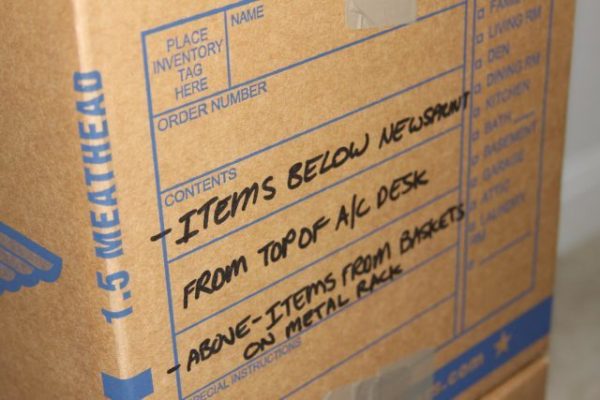
Labeling your moving boxes will make the unpacking process much more efficient. Label the boxes by category and by room (for example, Books, Library, Bedroom) to speed up the unloading process. If you’re more of a visual learner, use color-coded electrical tape to label your boxes.
This way, when you reach your new home, it will be easier to sort and unload everything.
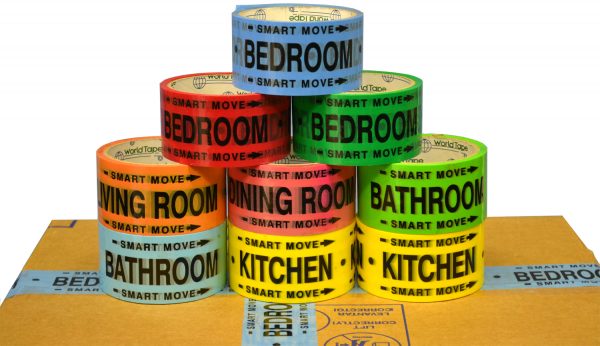
13. Implement a Numbering System for Boxes
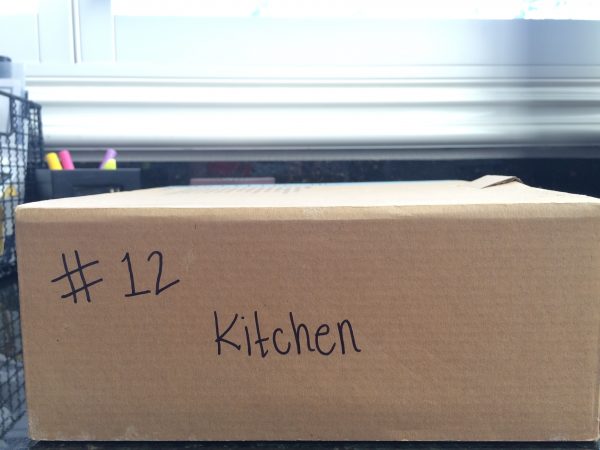
Take your labeling a step further by creating a numbering system. Number each box and create a list of its contents on your phone or in a document.
This system allows you to track the exact number of boxes being moved and easily locate specific items by referencing the number. It also helps in case any boxes are misplaced during the move.
14. Use small boxes for heavy items
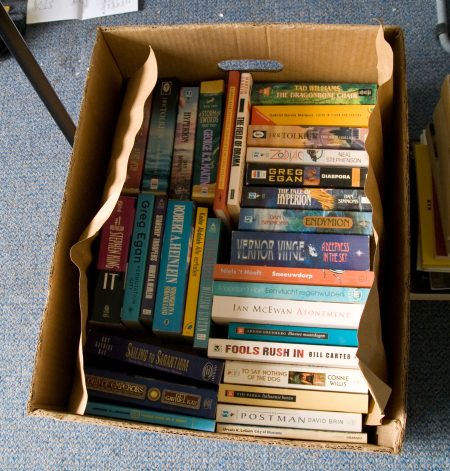
It sounds obvious, but if you’ve ever known the struggle of carrying a large cardboard box stuffed full of college textbooks across a parking lot, then you also know this advice cannot be overstated.
Fill your small boxes with heavier items and use large boxes for light things like decorative pillows, towels, and linens (here’s how to properly clean and store your bedding).
15. Use proper packing tape
When it comes to sealing your boxes, don’t just grab whatever tape is lying around in your kitchen drawer. Packing tape is worth the extra few bucks. It’s made specifically for moves and won’t abandon you halfway across town like that old roll of duct tape.
Here’s where people mess up all the time: they fold those cardboard flaps down and think they’re done. Nope! You need to actually tape the seams on both the top and bottom of every single box. It feels like overkill, but you really don’t want to be the person scrambling to collect your stuff from the truck floor because a box decided to give up on you during the move.
16. Protect fragile items with packing paper, bubble wrap, or blankets
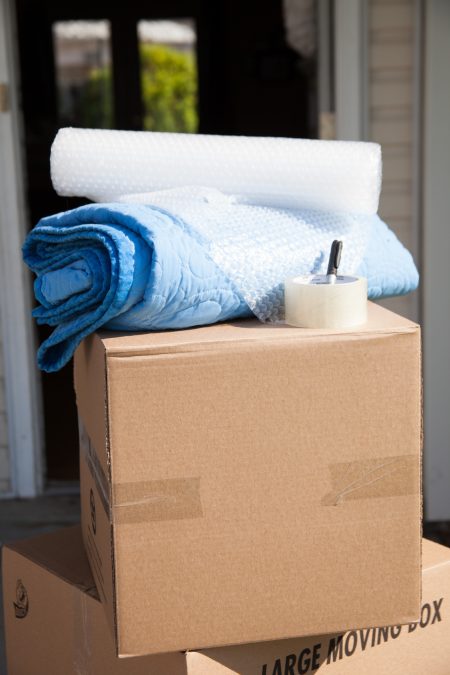
Remember that packing paper you put on your master list when you stocked up on supplies at the hardware store?
Use it to pad all your fragile dishware and decorative items. Stuff it inside glasses, wrap it around vases and bowls, and shove it between your dishes and the side of your boxes.
Make sure you wrap each of your fragile items separately, so they’re fully cushioned. If you don’t have packing paper, opt for bubble wrap or a quilted blanket.
17. Pack dishes vertically
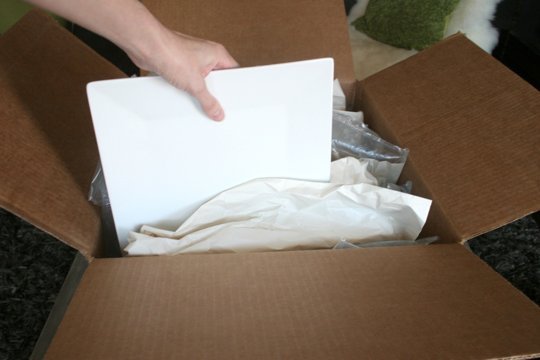
Don’t stack your dishes horizontally inside a box. Instead, wrap your plates and bowls in packing paper, gently place them into a box on their sides like records, and then fill the empty spaces with bubble wrap to prevent cracking and breaking.
18. Cover the tops of toiletry bottles with Saran Wrap

To prevent potential leaking and spilling, take an extra two minutes as you pack to secure your toiletry bottles. Unscrew the cap of your shampoo bottle, wrap a piece of Saran Wrap (or a Ziploc bag) over the top, and screw the cap back on. Simple and surprisingly effective.
19. Pack a clear plastic box with things you’ll need right away

This can include toilet paper, a shower curtain, hand soap, towels, sheets, snacks, or whatever else you think you’ll need for the first day or night in your new home.
Having a few essential items on hand will make you feel more comfortable and prepared to tackle unpacking everything else.
20. Pack a personal overnight bag
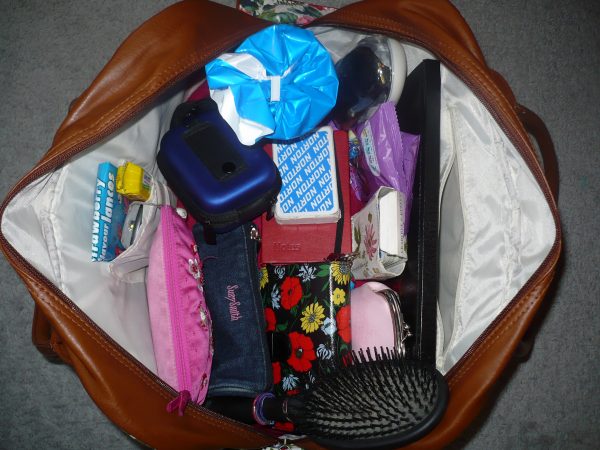
Chances are you won’t get everything unpacked on the first day, so bring whatever you need to feel relaxed and settled on your first night.
A change of clothes, your toiletries, a water bottle, and your laptop can go a long way in making your new place feel more like home.
21. Stop buying groceries a week before you leave
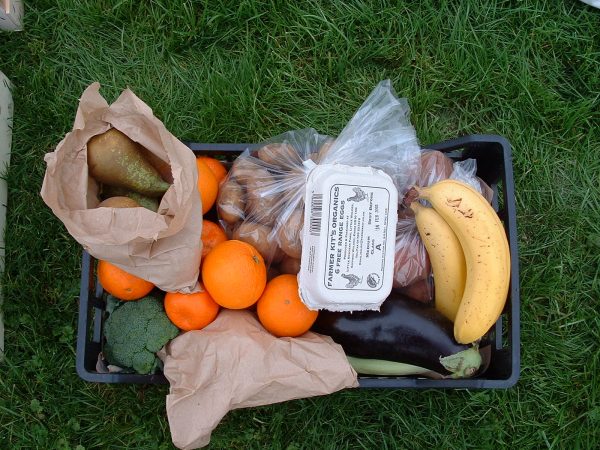
To save you the guilt of throwing away perfectly decent food, stop buying groceries a week or two before you’re scheduled to move. Try to make meals at home to use all the food you have left.
If you don’t finish everything, invite a friend or two over to see if they need some half-finished spices or boxes of pasta.
For anything you can’t get rid of, dispose of it responsibly if you can’t use it up in time.
For anything you decide to hold onto, store it in any of our 48 kitchen storage hacks that will keep everything in your kitchen incredibly organized.
22. Take pictures of your electronics

Before you take them apart and pack them up, take a few pictures of the back of your electronic devices — the cord situations, if you will.
Having these pictures will make it that much easier to set up your TV or monitor as soon as you move in — no fretting necessary.
23. Put your storage bins and luggage to use

Instead of trying to figure out how to pack up all your woven seagrass baskets, linen bins, and carry-on suitcases, store stuff inside them.
Think clothes and shoes for sturdy suitcases and hand towels, and pillowcases for lightweight, open-top bins and baskets.
24. Make copies of important papers
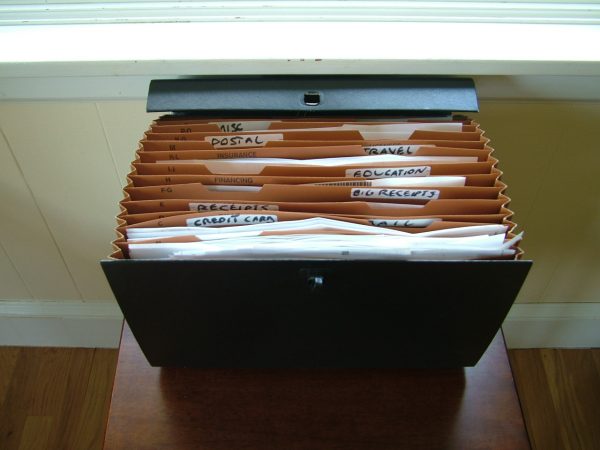
Pack a separate box or briefcase with copies of all your important documents in case of an emergency.
Though it takes a little extra effort, it’s worth it for peace of mind to scan or copy every birth certificate, passport, social security card, proof of insurance paper, and tax claim; you don’t want to risk damaging the only version of your papers in transit. They’re too precious.
25. Keep Ziploc bags handy

Keep a stash of Ziploc bags in your purse or backpack for the big moving day. You can use the bags to store doorknobs, tiny screws, and brackets, luggage keys, or other small, easily forgettable items.
Important Moving Tips (Planning, logistics, and loading/unloading)
Moving to a new home is exciting but stressful, especially with the logistics and planning. Whether you’re moving to a new house or just relocating to a smaller space, having a clear strategy in place is key. From packing up your belongings to loading and unloading on a moving day, every step requires preparation.
This section covers essential moving tips that go beyond packing; from scheduling, loading, and unloading to organizing your move-in day and setting up your new space. Whether you’re hiring pros or calling in favors from friends, these tips will help you stay in control and make moving day as smooth and stress-free as possible. Ready to make your move easier? Let’s jump in!
26. Research professional moving companies

Researching moving companies isn’t exactly thrilling, but it’s worth doing properly. With countless options on Google and Yelp, resist the urge to simply choose the first company with decent reviews.
Your choice of moving company can significantly impact your entire experience, so it pays to be selective. As Mike Sulkowska from Lift NYC points out, many people claim to be “moving companies” when they’re actually just individuals with a van looking to earn extra income.
Take time to review each company’s services, policies, and terms carefully. Some movers won’t handle items that aren’t properly boxed, while others require full payment weeks in advance. Understanding their damage policies and refund procedures beforehand prevents unwelcome surprises on moving day. This upfront research ensures you’re working with a legitimate, reliable company that matches your specific needs.
Clutter’s licensed and professionally trained moving experts are ready to help!
27. Choose the best moving day

Hire your movers at least a month out so you can plan accordingly. If you have a flexible schedule, play around with potential moving dates and try to find the cheapest time of the month to make an appointment.
Moving companies are busiest on weekends, so if you can skip the Saturday chaos and schedule your move for a Tuesday, you might get a significant discount.
Learn more: Moving Long Distance – 21 Best Long Distance Moving Tips
28. Map out the best way to get to your new home
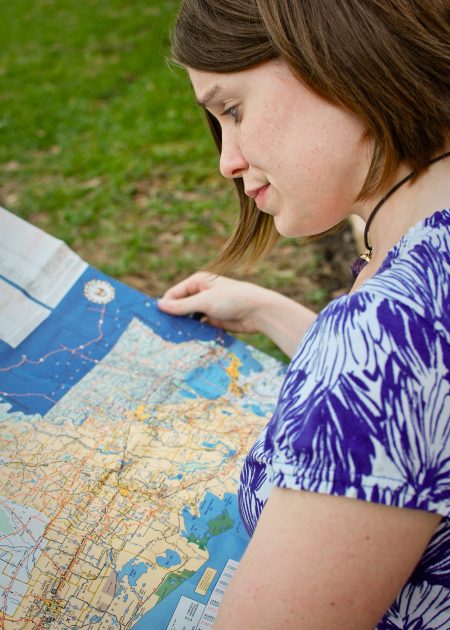
Whether you’re moving to NYC, across the country, across state lines, or just to a neighboring town, you’re going to need an efficient travel route so you don’t waste your move-in day sitting in gridlock traffic or pulling over three different times to type an address into your GPS.
Plan the most efficient route to your new home. Look up potential highway construction schedules ahead of time. And take traffic, detours, and necessary stops into account when you’re making your plan.
29. How to Move: Master Moving to-do List
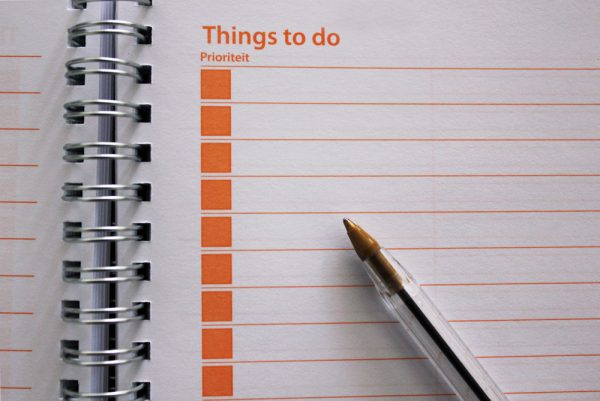
When you move homes and think about how to move, you inevitably end up having 600 different things to do and remember. Don’t let all these tasks and important reminders, no matter how seemingly obvious, slip your mind.
Write them down in your phone’s Notes app, a to-do list, or on a legal pad.
No detail is too insignificant. Do you just remember the name of the little bookstore in town that will accept your used novels? Write it down.
Not sure which novels to donate? Here’s how to decide what books to keep or get rid of.
Did you stick that extra screw from the broken drawer next to the sink? Take note.
Do you have to return your cable box to your provider at least one day before you leave? Jot it down.
30. Put moving tasks on your calendar
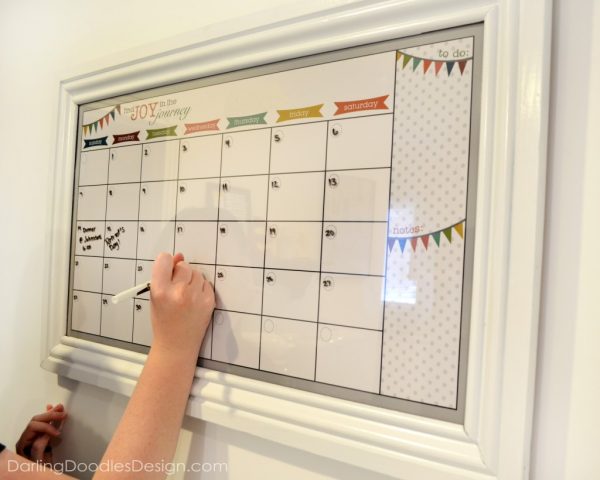
Go a step further by mapping out your tasks for the week. Get an oversized calendar and mark the empty white boxes with important daily tasks to prepare for your move.
Tuesday: Call the moving company.
Wednesday: Sort through toiletries.
Thursday: Buy new sheets.
An added bonus to using the calendar method is that breaking up your tasks by day makes them seem more manageable. Also, don’t forget to add “celebrate with wine” somewhere in there to give you something to look forward to.
Learn more: 6 Tips To Help You Settle Into Your New Home Quickly
31. Schedule disconnect times
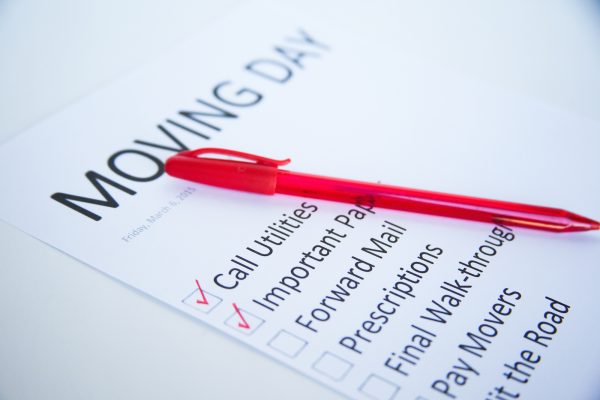
Call your utility providers a week before moving to schedule disconnections. Make sure you leave enough time in your schedule to gather any necessary items, like cords, remotes, or cable boxes — you may need to return.
32. Call in favors early

If you’re relying on friends and family to help with your move, be courteous and give them a month’s notice. Do the same with babysitters for your children.
Send out an email with the details of where to meet, what time, what to bring, and what to wear (read: no sundresses or uncomfortable shoes) so everyone is on the same page.
33. Change your address a week before you move
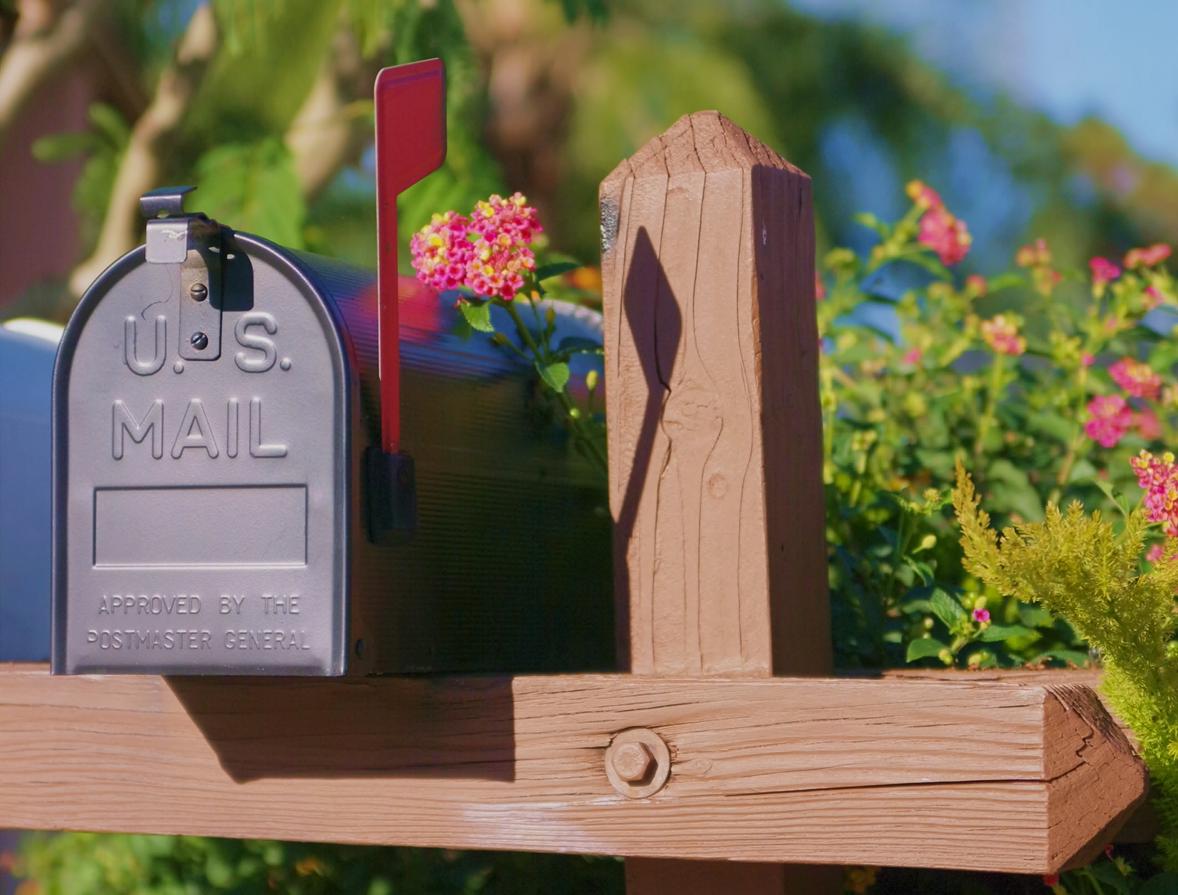
This is one of those things everyone forgets to do until they’re two weeks into life in a new home and they realize their Amazon Prime shipment still hasn’t arrived. Change your address ahead of time so your bills, credit card statements, and packages can arrive on time and without hassle.
Learn more: How to Choose the Best Storage Unit: 6 Expert Tips
34. Set aside cleaning supplies for moving day

Build a mini cleanup kit so you can do one final sweep through your home on moving day.
Keep a cleaning kit handy with broom, mop, cleaning products, and rags for a quick final sweep.
If you’re more the DIY type, try these easy deep-cleaning tips & hacks that make your home sparkle.
35. Defrost your fridge at least one day before you move

Defrosting your refrigerator and freezer is an important task that should be done a day or two before your move. This allows you to clean up any spills and avoid unpleasant odors in your new home.
Take the time to wipe down the interior and remove any food that will spoil during the move.
36. Load boxes from the same rooms together
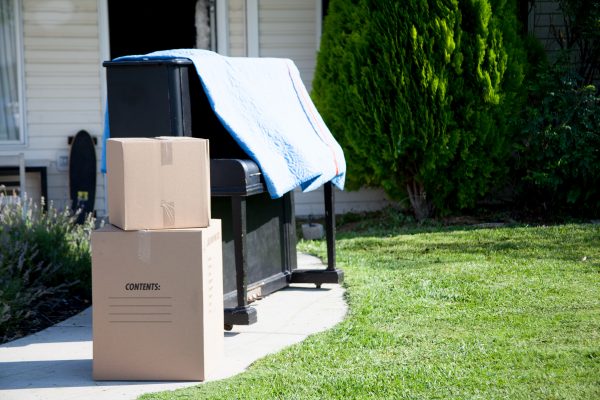
Stack and load boxes in groups according to the rooms indicated on the labels. Put all the kitchen stuff together, all the bedroom stuff together, and all the living room stuff together.
That way, you can unload all the boxes from the same rooms at the same time, which makes unpacking everything a cinch.
Learn more: Top 12 Essential Apartment Moving Tips for a Smooth Transition
37. Load heavy furniture into the moving truck first
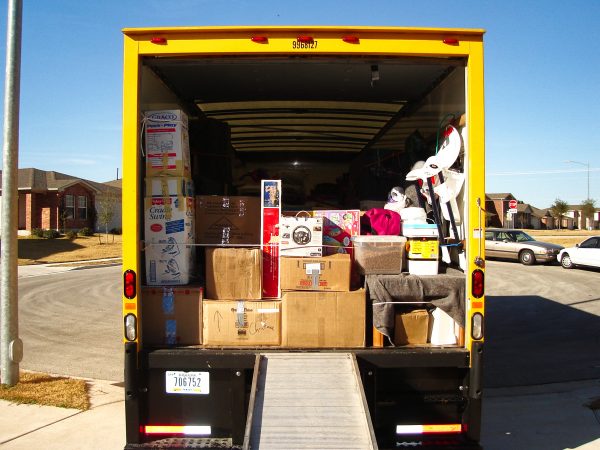
Start with your heaviest furniture, such as sofas and dressers, then work your way up to lighter pieces.
Here’s a space-saving trick: flip your couch on its side. It might look weird, but couches transport beautifully this way and free up tons of room for other items. Think creatively about positioning—sometimes the unconventional approach is exactly what you need to make everything fit.
Learn more: 21 Essential Moving and Packing Supplies You Need For Your Next Move
38. Photograph your new place before moving anything in

This moving tip really only applies if you’re renting your new home:
Before your friends and family start stacking boxes in the entryway or scuffing the doorway trying to shove your couch through, snap a few shots of your space so you can note any existing damage.
It’ll be more difficult to prove you didn’t cause that damage after you’ve moved in all your furniture.
Pro Tip: Nothing puts a dent in your moving happiness like putting a dent in the wall. So, pick up one of these space-saving sofas and couches that will actually fit in your apartment.
39. Delegate tasks when you’re unloading the moving truck
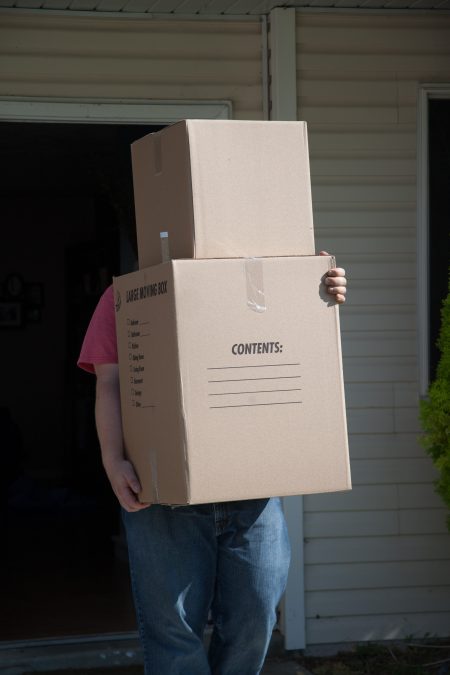
Figure out ahead of time who will be the chief on moving day. Whoever feels comfortable taking charge of the unloading and organization process (and inevitably answering 400 different questions) should assume this position.
Delegate every little task so no one is wasting time or sitting around with nothing to do. With all hands on deck, your unpacking process will fly by.
40. Make the beds first

Certified professional organizer and productivity consultant Jennifer Lava recommends making your bed as soon as you move in. That way, instead of worrying about tucking in your dust ruffle or finding the right set of sheets at the end of a long night, you can just crash out right away.
41. Be a good host

Take care of your movers or helpers, whether paid or not.
Learn more: Packing Ornaments: Essential Tips for Moving and Storage
Offer snacks or drinks, or order pizza or dinner through an app like Seamless.
Say your friends want food delivered from a restaurant that doesn’t actually deliver. Do you give up and settle for a different restaurant that does deliver? No way.
Use an errand-outsourcing service like TaskRabbit to pick up food everyone really wants and deliver it to you.
Let Us Make Your Move Effortless—Schedule Your Move Today!
8 Common Mistakes to Avoid While Packing and Moving
- Don’t skip measuring furniture and doorways – Always measure large furniture and doorways to ensure everything fits in your new space. Moving home tips include avoiding last-minute surprises.
- Don’t pack items you won’t need for months – Don’t waste time and space packing items you won’t use immediately. Tips for packing to move involve packing seasonal or seldom-used items first.
- Don’t use flimsy boxes – It is best to use strong boxes to avoid breakage or damage while moving. Moving packing tips emphasize the use of good-quality packing materials.
- Don’t neglect weight distribution in boxes – Do not overload boxes with heavy stuff. Rather, use moving house packing tips to distribute the weight.
- Don’t forget to disconnect appliances – Disconnect all appliances before packing them to prevent possible damage or delays during the relocation. Preparing to move involves proper handling of appliances.
- Don’t neglect insurance – Always consider moving tips to insure valuable items in case of damage or loss during the move.
- Don’t pack perishables – Avoid packing food that may spoil or leak. Instead, dispose of or donate these items that can’t be moved safely.
- Don’t try to move everything yourself. Moving efficiently means knowing when to hire professionals for heavy lifting and handling valuable or fragile items. Clutter’s moving services can help by providing professional movers to help with packing, loading, and transporting your belongings.
Conclusion
Moving doesn’t have to be stressful when you’re prepared. By following these moving tips and packing tips, you can make the process smoother and more organized. Start by decluttering and packing early, and be sure to create a solid moving packing list. Whether you’re moving to a new house across town or to a new city, using the right approach can save time and energy.
With a little planning and the best way to pack for moving, you’ll feel more confident and in control. Remember, knowing how to prepare to move in advance can make all the difference. By planning early, you’ll reduce stress and ensure everything goes smoothly on moving day.
FAQs for Moving and Packing Tips
When is the best time to start packing for a move?
It’s best to start packing at least 4 to 6 weeks before your move. Begin with non-essential items and gradually pack up rooms you use less frequently.
Which room should be packed first when moving?
Start by packing rooms that are used less often, such as the guest room, attic, or storage areas. This allows you to focus on everyday spaces closer to moving day.
What is typically the hardest room to pack when moving?
The kitchen is often the hardest room to pack due to the numerous fragile items, appliances, and food. It’s best to start packing the kitchen early and use proper packing materials.
Is it okay to pack clothes in boxes for a move?
Yes, you can pack clothes in boxes, but using wardrobe boxes or suitcases can help prevent wrinkles and make the process easier. For delicate fabrics, consider garment bags.
How many boxes will I need to pack up an average home?
The number of boxes varies based on the size of your home, but on average, a 2-3 bedroom home may need 40-60 boxes. It’s always good to have extra boxes on hand for unforeseen items.


